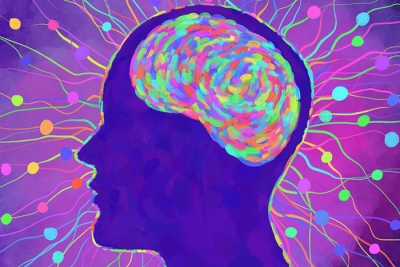
I.STOCK.COM/ELENA MEDVEDENA
A little more than a year ago, at the Academic Resources Fair in September, philosophy professor Christopher A.B. Peacocke was manning an information table about the College’s newest major, cognitive science. It didn’t take long for him to realize the subject was striking a chord. “There was this enormous line, people expressing an interest,” recalls Peacocke, who was instrumental in the major’s launch. “By end of the day, we had sign-ups in the triple figures. That is absolutely gigantic.”
Today, there are around 90 declared majors in cognitive science, which, simply put, is the study of how the mind works. As an interdisciplinary subject, it taps into concepts from psychology, neuroscience, linguistics, economics, computer science and philosophy, among other areas.
“Whether it’s AI, human-technology interaction, economics, politics, art and music, or bioethics (including climate change), we’re increasingly living in a world where the essence of humanity is put to question,” says Mariusz Kozak, the College’s director for cognitive science, as well as an associate professor of music and music theory. “The field gives students tools to help answer that question from a variety of perspectives: computational, behavioral, neural, social or philosophical.”
Peacocke, the Johnsonian Professor of Philosophy and also the department chair, notes that the subject has tremendous currency. These are students for whom computers loom large, he says, and whose undergraduate careers have coincided with the arrival of significant leaps in artificial intelligence. “These ideas are very much central to their consciousness,” Peacocke says. “Just asking about the difference between [a language-modeling program like] GPT-4 and something that’s really got a mind can raise a number of psychological and philosophical issues.”
Cognitive science is the first interdisciplinary major to be offered jointly by the College and Barnard. Peacocke’s counterpart at Barnard, philosophy professor and department chair John Morrison, partnered with him in establishing the program.
The next step at Columbia, Kozak says, is for cognitive science to become solidly incorporated into the various academic and administrative levels: “I’d like to see the creation of an intellectual hub for our students and our faculty — who teach in different schools and departments, and often don’t even know each other — to use as a home.” He adds that he’d also like to create a study abroad program that capitalizes on Columbia’s Global Centers. “I want our students to experience firsthand what it’s like to work closely with scientists or scholars who understand the human mind from different perspectives.”
Asked where cognitive science majors land after graduation, Peacocke gives the tech industry as a prime example. “They don’t want pure programmers anymore; they want people who have this humanistic dimension,” he says.
Kozak offers the larger perspective: “Our university continues to graduate young people who go on to become leaders in their fields. The rapid technological, social and ecological changes we see around us necessitate that these leaders are able to think across boundaries, and to see how tackling huge global problems requires multiple solutions. Interdisciplinary thinking is a precondition for helping create a modern world that fosters humanity in all its guises.
“AI programmers must have a sense of the ethical implications of their work,” he continues. “Humanists must have working knowledge of how technology is built and how specifically it impacts our world. Scientists must understand how and why art expresses humanness and artists must understand the effects of their work on the human psyche. Cognitive science is a program that teaches students to do just that.”
For more information, visit the cognitive science major page.